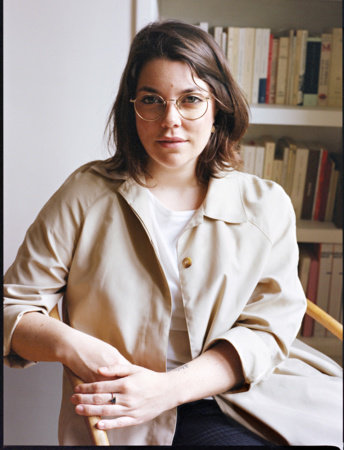During a celebration of New
Year's Eve at her friend's apartment, the narrator, who is a teacher, meets
Sarah, who is a violinist, for the first time. Very soon, they keep in touch
with each other, start to hang out, go to diners, cinemas and theatres, and it
doesn't take long for Sarah to admit that she's in love with the narrator. Their
intimate relation1 begins to unfold, with burning passion for each
other's presence, company and sensual engagement. They start spending time in
each other's apartment, talk tirelessly and make love. When Sarah is out of
Paris for her concert performances, the separation and longing for them become
unbearable2.
1.
She’s alive. She doesn’t realize that nothing
matters to me now except the time I spend with her, that I’m feeling depressed,
that I don’t like my work anymore, that I’ll get my doctor to give me a
sicknote as soon as I can.
2.
It’s all about Sarah, her mysterious beauty, the
sharp lines of her gentle bird-of-prey nose, her pebble-like eyes, green, but
no, not green, her unusual colored eyes, her snake eyes with their drooping
lids. It’s all about Sarah the impetuous, Sarah the passionate, Sarah the
sulfurous, it’s all about the exact moment when the match flares, the exact
moment when that piece of wood becomes fire, when the spark lights up the
darkness, when burning springs out of nowhere. The exact moment is tiny,
everything turned upside down in barely a second. It’s all about Sarah, symbol:
S.


However, in the period of two
years, the love, obsession and desire for each other become a kind of madness,
such that they're exhausted by each other's company, and want to end3
the relationship, but miserably fail, something always dragging them together. The
narrator becomes excessively sensitive to their relationship, as is evident in her
obsession with the tiniest details about Sarah, even about things, thoughts and
words that defines the relationship – which brings them joy and pleasure, but
also exhaust them, and slowly becomes burden to their own personal freedom and
private life. Latency, Sulfur, Passion, Ludwig van Beethoven’s String Quartet
No. 13 in B-flat major, The Four Seasons by Vivaldi, François Truffaut's Bed
and Board, Hiroshima, My Love – these allegories or interludes that come in
between seem abrupt, but on closer look it is a poetic representation of the
core of the tension; silhouette of the overcasting cloud over their excesses,
over their wavering4, 5 commitments.
3.
Sometimes she goes mad. Mad with fury then mad
with misery. She screams, throws herself at me and scratches my face, with a
monstrous expression on hers. She’s worse than a witch in a fairy tale. She
resents me, for everything, for stealing her time, stealing her youth, stealing
her family’s love, stealing the idea she’s had since childhood of how she
should live her life. She doesn’t say it but I can hear it, it rings in my
ears, thief, thief, thief. She gets angry with me for silly little things, all
sorts of things, but deep down, I can tell, she’s angry with me for existing,
for coming into her life, she’s angry with me for being a woman. She resents me
because she can’t suddenly just love me in peace. She flies into blazing
tempers, unforgettable tempers. Her little body is transformed. She looks like
an animal, a furious animal, she roars, flushed red all over. And in the heat
of the moment she forgets the Venetian love, the hidden kisses, the endless
fondling.
4.
She wants us to go to the cinema, she wants us
to make love, then she wants us to fall asleep in each other’s arms, she wants
us to stop messaging and talking to each other for a few days, she wants us to
eat Japanese, she wants us to go away to the country for a weekend to rest, she
wants me to stop crying, she wants to go to a party without me, she wants to
have no responsibilities, she wants to be footloose, she wants to be free.
5.
It’s all about Sarah, unpredictable,
temperamental, disturbing, changeable and terrifying as a moth.
After knowing about Sarah's
breast cancer, it becomes more of a torment for the narrator to be in her
presence any more. She decides to run away from the city, and ends up in an old
apartment in Trieste, Italy, only to be haunted by the episodes, words, images
and memories of Sarah. Her days in Trieste, told in almost a dreamlike or in a
stream of consciousness like fashion, reads as a chasm of an unfulfilling love
affair brought upon an individual.
This psychological account of a
lesbian love, delves deep into the joys and horror of a love affair, but departs
from traditional romantic–tragic novels in many senses. The story has a poetic
sensibility to it, a rhythm of an unfathomable passion, overturning the lives, and slowly dissolving into
personal crisis – embarrassment and emotional torment of being in such a
fervent love and desire for each other. They Say Sarah is a moving tale of two women, where passion turns nightmarish.
Author: Pauline Delabroy-Allard
Translator: Adriana Hunter
Publisher: Other Press
Author's Photo Source: https://images.randomhouse.com/author/2201244
Review Copy Courtesy: Other Press




No comments:
Post a Comment